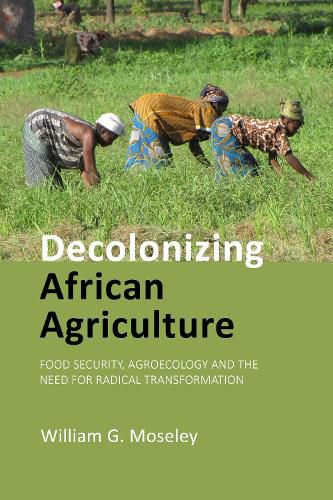Readings Newsletter
Become a Readings Member to make your shopping experience even easier.
Sign in or sign up for free!
You’re not far away from qualifying for FREE standard shipping within Australia
You’ve qualified for FREE standard shipping within Australia
The cart is loading…






Why have so many approaches to farming and food policy failed in Sub-Saharan Africa? Because, argues William Moseley in this compelling analysis, of the shortcomings of a prevailing western, colonial agricultural science that is infused with power and politics. To tackle food security successfully, the book argues, we need a non-colonial, indigenous agronomy that creates the social innovation needed to support the livelihoods of small-scale farmers.
The book is organized in four sections: Part 1 provides a broad conceptual introduction emphasizing political agronomy, political ecology and agroecology. Part 2 evaluates past food security and agricultural development experiences in four countries where Moseley has undertaken extensive field research over several decades: Mali, Burkina Faso, South Africa and Botswana. Part 3 examines successful efforts in each of these countries and outlines future directions that emphasize the application of ecological principles to agricultural systems. In Part 4, Moseley advocates building more resilient food systems and a different kind of development that supports agroecology, vibrant rurality and networks of smaller cities. Achieving this transformation will require institutional reform at the global level, of those multilateral and bilateral agencies involved with farming and food policy.
Written for an academic and policy readership, as well those interested in international food security, the book is suitable for courses on food politics, agroecology and sustainable development.
$9.00 standard shipping within Australia
FREE standard shipping within Australia for orders over $100.00
Express & International shipping calculated at checkout
Why have so many approaches to farming and food policy failed in Sub-Saharan Africa? Because, argues William Moseley in this compelling analysis, of the shortcomings of a prevailing western, colonial agricultural science that is infused with power and politics. To tackle food security successfully, the book argues, we need a non-colonial, indigenous agronomy that creates the social innovation needed to support the livelihoods of small-scale farmers.
The book is organized in four sections: Part 1 provides a broad conceptual introduction emphasizing political agronomy, political ecology and agroecology. Part 2 evaluates past food security and agricultural development experiences in four countries where Moseley has undertaken extensive field research over several decades: Mali, Burkina Faso, South Africa and Botswana. Part 3 examines successful efforts in each of these countries and outlines future directions that emphasize the application of ecological principles to agricultural systems. In Part 4, Moseley advocates building more resilient food systems and a different kind of development that supports agroecology, vibrant rurality and networks of smaller cities. Achieving this transformation will require institutional reform at the global level, of those multilateral and bilateral agencies involved with farming and food policy.
Written for an academic and policy readership, as well those interested in international food security, the book is suitable for courses on food politics, agroecology and sustainable development.